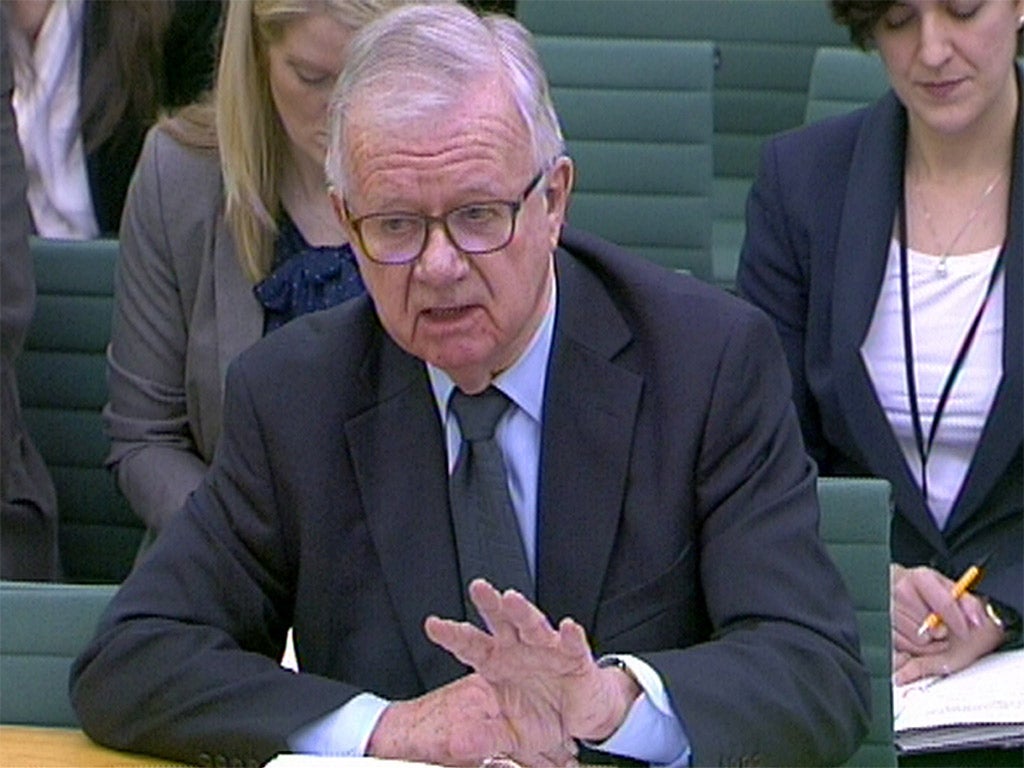Chilcot inquiry rejects MPs’ calls to set deadline for Iraq report
Inquiry chairman says ‘timing’ matters less than being ‘thorough and impartial’

Sir John Chilcot has rejected mounting pressure from MPs to set a date for the end of his marathon six-year inquiry into the 2003 Iraq war.
The former senior civil servant admitted the families of the 179 British servicemen killed in Iraq wanted to know the truth as soon as possible. But he said: “The risk of either arousing false hopes or false expectations either way outweighs for me the powerful appetite, for all sorts of often good reasons, to know when the report is likely to become available.”
He said his inquiry had a “conscious duty” to get “access to the truth”, and moving at a quicker pace could have undermined the “depth” of its final report.
Sir John was questioned for 70 minutes by the Commons Foreign Affairs Select Committee about his committee’s failure to produce its report before the general election in May. He insisted: “I don’t believe the timing in relation to a political event, even one as important as a general election, determines the issue. What I am determined to do is to get the report to the Prime Minister and out as soon as we can.”
The inquiry, which Sir John had expected to last two years, has already cost more than £9m. Nadhim Zahawi, a Tory member of the committee, told him: “The uncertainty is clearly painful for the families.”
Defending the delay, Sir John said: “We have to maintain the principles by which we have operated throughout: fairness, thoroughness and impartiality. It is our duty to deliver a report which gives the Government, Parliament, the public, and particularly all those who have been deeply affected by events in Iraq, the answers they deserve.”
The Iraq War: A timeline
Show all 16In his first appearance before MPs since his investigation began in 2009, Sir John admitted he had underestimated the time it would take to analyse the 150,000 government documents that had been submitted, covering a nine-year period. “Constructing a reliable account is a massive task,” he said.
He said one of the main reasons for the delay was a 13-month period in which the inquiry secured the release of documents detailing conversations between Tony Blair and George Bush in the build-up to the US-led invasion. Sir John described “quite difficult exchanges” and a “very challenging process” in talks with Lord (Gus) O’Donnell, the former Cabinet Secretary and his successor, Sir Jeremy Heywood. But he did not point a finger of blame at the two Whitehall mandarins.
Sir John was not prepared to forecast a date for delivering his report until the completion of the “Maxwellisation” process, under which witnesses are sent draft sections criticising them to give them a final right of reply. This is the primary cause for the latest delay. Those who may be criticised include Mr Blair; Jack Straw, the former Foreign Secretary; and Sir Richard Dearlove, the former head of MI6.
He would not confirm how many such letters had been sent out but did not dispute a suggestion that some of the draft criticisms run to hundreds of pages. He said: “As of today I have no reason to think that anyone in the Maxwellisation process is seeking to spin out the time for any reason.”
But he warned: “We are not going to give people an infinite amount of time – only the amount of time we think is reasonable for them on a case-by-case basis.”
The inquiry chairman added: “What I can’t say, until the Maxwellisation process is complete, is that I will be able to say anything useful to the Prime Minister or to the families. Once that is complete it is a different matter.”
David Davis, the Tory MP, suggested that the civil service was partly to blame for the delay. “The Sir Humphrey Mafia are being difficult. They have an interest in keeping secrets,” he said.
Tim Farron, the Liberal Democrats’ foreign affairs spokesman, said it was “appalling” that the families of those killed in Iraq had had to wait so long to find out why Britain had gone to war.
“This country deserves answers. The people who lost loved ones in Iraq deserve answers,” he said.
Yesterday’s hearing began on a sombre note when Sir John announced that one of his inquiry team, the historian Sir Martin Gilbert, died on Tuesday night after a long illness.
Sir John said the committee had benefited from Sir Martin’s “wisdom and insights” and rejected suggestions that his illness had delayed the inquiry’s progress.
The historian was best known for his biography of Sir Winston Churchill, the 50th anniversary of whose death was marked last week.
Subscribe to Independent Premium to bookmark this article
Want to bookmark your favourite articles and stories to read or reference later? Start your Independent Premium subscription today.

Join our commenting forum
Join thought-provoking conversations, follow other Independent readers and see their replies